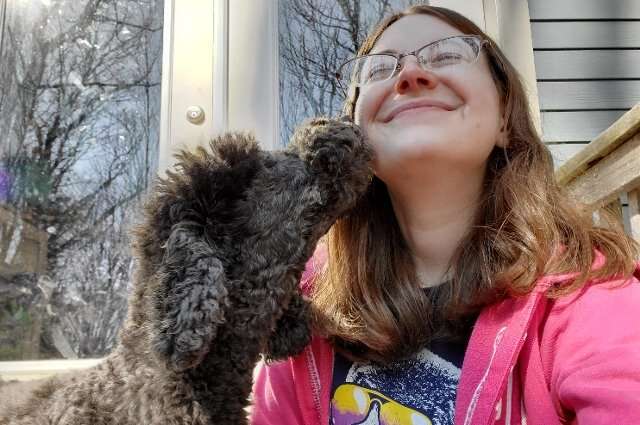
The loss of our daily routines as we knew them—and the threat of more serious casualties to come from COVID-19—has put a serious emotional strain on all of us. So perhaps it should come as no surprise to see social media feeds flooded with photos and videos of cats, dogs, and other companion animals rising to the occasion.
Pets are serving as our companions in coping throughout the U.S., from suburban kitties taking over “office” chairs and keyboards to rural dogs hunkering down at home. Even celebrities have gotten in on the act—with Anthony Hopkins serenading his cat, and Arnold Schwarzenegger delivering a stay-at-home video PSA starring his pet donkey and miniature horse in his kitchen.
This instinct to turn to our pets during this pandemic is supported by science, said Megan Mueller, A08, G10, G13, the Elizabeth Arnold Stevens Junior Professor at Cummings School and a researcher studying how pets help people.
Pets provide nonjudgmental emotional support, she said, and studies show that “contact with pets help reduces stress and anxiety, particularly when you are experiencing a stressful situation.”
Research also has shown that animals help older adults cope better with social isolation—that is, being physically separated from others—and with loneliness, said Mueller, who is also co-director of Tufts Institute for Human-Animal Interaction and a senior fellow at Tisch College.
In day-to-day life, seniors tend to more at risk of social isolation and loneliness because of factors related to that stage of life, including spouses and friends passing away, being stuck at home due to health or transportation issues, or children being occupied with work and raising their own families.
Now, though, “everyone is truly physically isolated,” said Mueller, who is curious whether the same benefits seen in seniors apply to the general population during COVID-19.
Mueller said that people these days should consider spending extra time with their pet—it could provide a much-needed boost.
“A lot of us are connecting remotely with other people right now, and that’s great,” she said. “But pets are physically present in a way that other forms of social and emotional support aren’t these days for many people, and there’s really something to having that tactile component of petting or touching a pet.”
Of course, individual differences will apply to both people and pets. For example, Mueller said with a laugh, in her case working from home with a toddler means she sometimes has “too much contact with others right now.” But her dog, Jett, gives her a great excuse to take a break and head outside for some quiet, fresh air, and exercise.
“Pets can motivate you to do things that are good for your own mental health,” said Mueller. “And activities with animals that you enjoy or that are part of your routine help bring back some degree of normalcy.”
Those benefits ring true for Catherine Castonguay of New Braintree, Massachusetts, whose pets have been patients of the Henry and Lois Foster Hospital for Small Animals.
Source: Read Full Article
